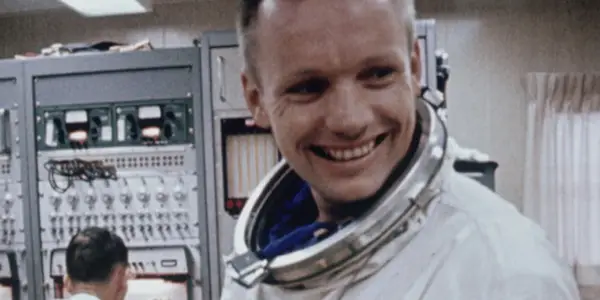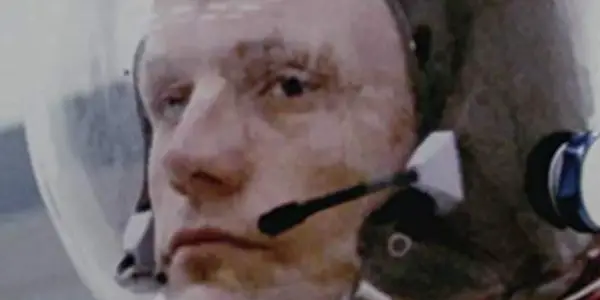ARMSTRONG: An Aim Well Below The Moon Still Falls Short

Jim (Twitter: @JimGR) has written about film since 2010, and…
The 50th anniversary of the moon landings has led to a spate of retrospectives jostling for position and attempting to take different angles on the Apollo 11 mission. Armstrong, directed by David Fairhead and narrated by Harrison Ford, is focused upon the individual that took that famous “small step for man”, documenting Neil Armstrong‘s life before, during and after the historic mission.
An approach that doesn’t reach for the moon, let alone stars
The film is not really much of a moonshot in terms of approach. Talking heads that knew Armstrong over the course of his life – initially his children and ex-wife, before moving on to Air Force and NASA colleagues – are asked about the man and his reaction to various events throughout his life: personal tragedies, military service, the space program and the celebrity aftermath.
At numerous points we are regaled with the engineering and aviation prowess of Armstrong, with each person, in turn, reiterating their belief he was the only man for the job. However, the more critical aspects of Armstrong’s day-to-day life go largely unexplored. His absence from his children’s lives for long stretches is addressed briefly, and is, indeed, mentioned by his ex-wife Janet (sadly deceased since filming) but the film quickly moves on. Few films deserve the hagiographical pejoratives often thrown around when a film is less-than-critical of its biographical subject, but Armstrong certainly doesn’t come across as a rounded portrait of an undoubtedly interesting man.

More than once someone describes Armstrong as some variant of “a straight arrow”. The thing is, however, that, without any further insight, listening to people describe a straight-laced man doesn’t make for an informative documentary.
Ostensibly, in the absence of it elsewhere, that insight should come from the narration of Harrison Ford. Relaying Armstrong’s own words, the actor is called upon to lend them some gravitas. However, Ford‘s delivery belies a disinterest in someone else’s words. The neutrality in his tone compounds with a monotony in his rhythm, which isn’t counter-balanced by the visuals placed alongside or anything poetic in Armstrong’s prose itself.
Technical approach that is knocked off course
Given the inherently interesting subject matter, if the film is executed well enough it is reasonable to assume that the film will be engaging if maybe not the most cinematic. However, there is an inconsistency in the technical approach that mars even this aspect, introducing a visual disjointedness which then draws the viewer out of the subject.
Archive footage is necessarily in 1.33 aspect ratio of TV of the time, whereas most interview segments are shot in something approaching anamorphic widescreen. Also done in the wider angle are what amount to dramatised still life shots: the camera tracks in or across a desert surface, a bedroom adorned with aeroplane models, a coffee table with 1969 magazines laid out, or similar. These are a deep contrast to archive footage, but interview segments with Janet Armstrong, however, introduce a third shot type: these are shot in 16:9 conventional widescreen ratio. The constant chopping and changing don’t serve the film’s immersion levels well, and without much backup from the approach otherwise, delivers a sense of a film straining to reach cinematic levels only to sputter back to earth.
Eclipsed by other films in recent orbit
All this might yet still be passable if the film delved into interesting aspects of Armstrong’s life. It is, after all, the supposedly differentiating factor between this film’s subject and another recent release: the very well-received Sundance 2019 debutante Apollo 11. The focus is on the man that achieved this feat, rather than the – still unfathomably impressive – technical achievement.
However, the rather staid approach to chronicling Armstrong’s life undermines this, playing out as it does in strictly chronological order. This need to outline his personal timeline means we spend more than a few minutes examining Armstrong’s suitability for roles he held on corporate boards between his return to civilian life and work on the Challenger disaster’s investigation committee. Factual, yes, but hardly the stuff people look to the sky and dream of.

The film’s singular focus also skirts past a number of topics of interest. Given the controversy around the flag-planting – or lack thereof – in Damien Chazelle‘s narrative feature First Man, Armstrong’s words (although dryly vocalised by Ford) are illuminating. Hearing him say that a United Nations flag was considered but, ultimately, he “was less concerned about whether it was the right artifact to place there” punctures the vitriolic rhetoric that surrounds the achievement. Once again, though, the film quickly moves on.
First Man, in fact, seems to offer greater insight than this more direct account into how Armstrong ticked and his motivations. Although a fictional account, it is based on a written biography by James R. Hansen. The insight garnered there is combined with a technically impeccable dramatisation of the catalysing events in Armstrong’s life and career, showing why he might have been exhausted with the project afterwards beyond a mere aversion to public notoriety.
Armstrong: Conclusion
As a result, Armstrong‘s shortcomings are exacerbated by unflattering comparisons. Rather than looking skyward, Armstrong awkwardly looks at its feet, the film eclipsed by other efforts both fictional and factual.
What are your favourite films about the space program? Have fictional films done a better job at telling those stories? Let us know in the comments below!
Watch Armstrong
Does content like this matter to you?
Become a Member and support film journalism. Unlock access to all of Film Inquiry`s great articles. Join a community of like-minded readers who are passionate about cinema - get access to our private members Network, give back to independent filmmakers, and more.
Jim (Twitter: @JimGR) has written about film since 2010, and is a co-founder of TAKE ONE Magazine. His written bylines beyond TAKE ONE and Film Inquiry include Little White Lies, Cultured Vultures and Vague Visages. From 2011-2014 he was a regular co-host of Cambridge 105FM's film review show. Since moving back to Edinburgh he is a regular review and debate contributor on EH-FM radio's Cinetopia film show. He has worked on the submissions panel at Cambridge Film Festival and Edinburgh Short Film Festival, hosted Q&As there and at Edinburgh's Africa In Motion, and is a former Deputy Director of Cambridge African Film Festival. He is Scottish, which you would easily guess from his accent.












